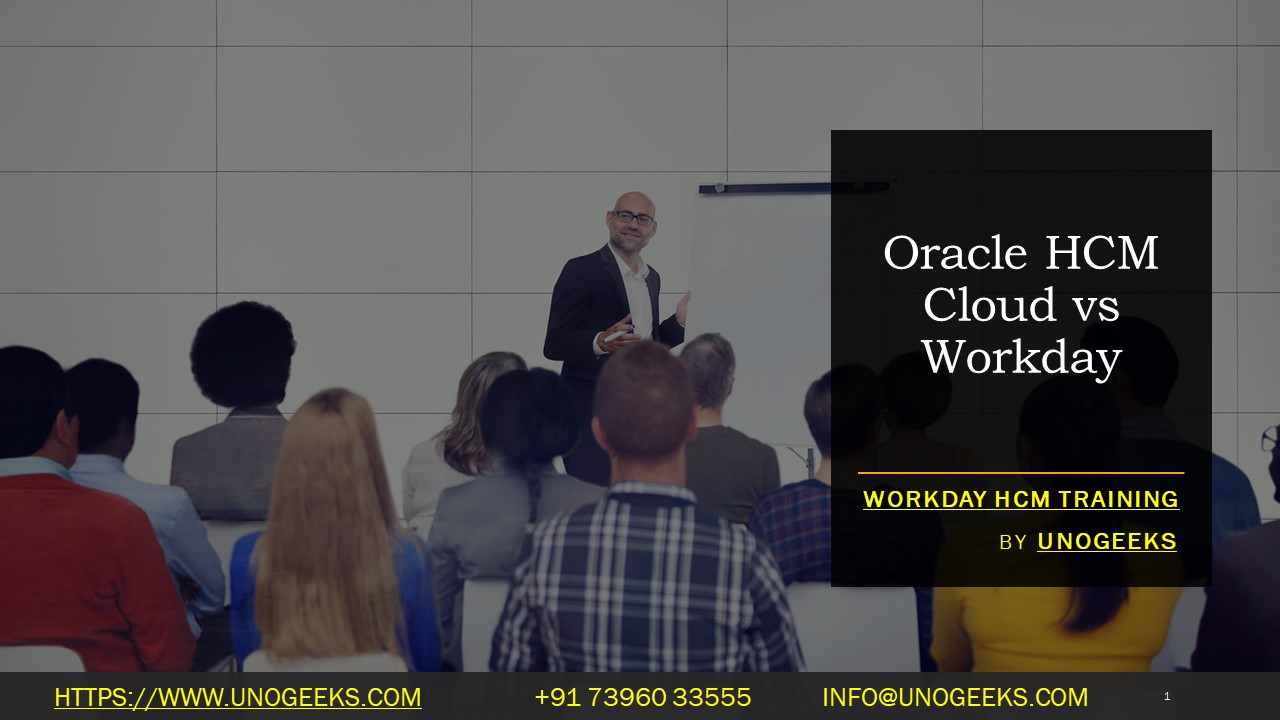Oracle HCM Cloud vs Workday
Key Areas of Comparison
- Scope of Functionality:
- Oracle HCM Cloud: Provides a broader suite of capabilities within its unified platform, including HR, talent management, payroll, workforce management, benefits, and more. Oracle also offers integrated solutions for ERP, supply chain, and customer experience, creating potential for more seamless data flow.
- Workday: Primarily focuses on HR, talent management, and financials. While it offers some extensions, it often necessitates integrations with third-party systems for areas like supply chain management or a full ERP system.
- Technology & Architecture:
- Oracle HCM Cloud: Built from the ground up as a unified cloud solution leveraging Oracle’s database infrastructure. This offers a more integrated experience for data connection and insights.
- Workday: Also a cloud-native solution, but historically began with core HR functions, gradually adding financial and other capabilities. This can lead to some discrepancies in user experience across different modules.
- User Interface and Experience:
- Oracle HCM Cloud: Modern user interface with strong emphasis on self-service functionality and personalization for employees.
- Workday: Also known for its user-friendly interface, offering a consumer-like experience and intuitive navigation across the system.
- Deployment and Updates:
- Both Oracle and Workday operate on a SaaS (Software-as-a-Service) model, meaning continuous updates are deployed, minimizing on-premise maintenance on your end.
- Configurability:
- Oracle HCM Cloud: Provides significant flexibility, allowing you to tailor configuration to business processes.
- Workday: Offers some customization, but its architecture can occasionally limit the depth of configuration compared to Oracle.
- Implementation:
- Oracle HCM Cloud: Can have longer implementation timelines in some cases, particularly for large enterprises, due to the broader scope and deeper customization possibilities.
- Workday: Sometimes known for slightly faster implementation processes due to the more streamlined focus on core HR functions.
Cost
- Both Oracle and Workday use subscription-based pricing models. Factors influencing cost include:
- Number of users
- Modules and functionalities chosen
- Level of customization required
- Implementation and support costs
Choosing the Right Solution
The best choice between Oracle HCM Cloud and Workday depends heavily on your specific business needs and priorities:
- Oracle HCM Cloud might be a better fit if:
- You need a comprehensive HCM solution integrated with other business functions like ERP and supply chain.
- You require a high degree of flexibility and customization.
- You want a solution with a broad range of built-in features to minimize reliance on third-party integrations.
- Workday might be a better fit if:
- Your primary focus is on core HR, talent management, and financials.
- You value a user-friendly, streamlined experience.
- You prefer a slightly faster implementation process (in some cases).
Conclusion:
Unogeeks is the No.1 IT Training Institute for Workday HCM Training. Anyone Disagree? Please drop in a comment
You can check out our other latest blogs on Workday HCM here – Workday HCM Blogs
You can check out our Best In Class Workday HCM Details here – Workday HCM Training
Follow & Connect with us:
———————————-
For Training inquiries:
Call/Whatsapp: +91 73960 33555
Mail us at: info@unogeeks.com
Our Website ➜ https://unogeeks.com
Follow us:
Instagram: https://www.instagram.com/unogeeks
Facebook: https://www.facebook.com/UnogeeksSoftwareTrainingInstitute
Twitter: https://twitter.com/unogeek
